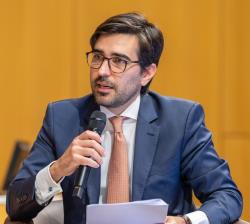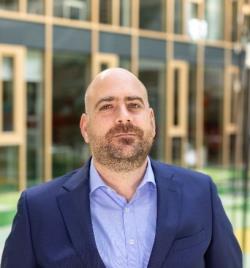Intellectual Property and eSport for Development
World Intellectual Property Organization
Session 242
Esport is no longer a newcomer in the entertainment industry but a mass global phenomenon. From over 300 million esport enthusiasts to the 1,38 billion Usd revenue, e-sport has impressive numbers. Video game industry, professional players, competition organizers and streaming platforms, the different stakeholders of the industry are connected through intellectual property. This panel will tackle the practical use of intellectual property in esports and how the World Intellectual Property Organization (WIPO) could foster the efficient use of IP in the e-sports environment.

For over 10 years Rafael Ferraz Vazquez has participated in global IP policy discussions as part of the Copyright and Creative Industries Sector of the World Intellectual Property Organization (WIPO). He obtained his bachelor from the Federal University of Rio de Janeiro (UFRJ) and holds a master degree in Intellectual Property and Information Society from the University of Alicante, Spain. Before joining WIPO, Rafael worked as a lawyer in Brazil where he advised Brazilian and foreign companies on intellectual property issues including licensing negotiation and strategic IP protection. Rafael had also collaborated with other international organizations such as the EUIPO before joining the Copyright Law Division at WIPO. Currently, Rafael focuses on IP commercialization to help SMEs, specially in the Creative Industries, to enhance the strategic use of their IP as part of the IP for Business Division at WIPO.

Head of Esports at VIDEO GAMES EUROPE, representing the video games industry in Brussels. Before, Sergi was co-founder and Public Affairs Vice President at LVP Liga de Videojuegos Profesional, the biggest esports company in the Spanish-speaking market, coordinator of the esports workgroup at AEVI (Asociación Española de Videojuegos) and chairperson of the International Esports Chair at Universidad Católica de Murcia (UCAM).

Alexia Gkoritsa is a Legal Case Manager at the Business Development Unit of the Arbitration and Mediation Center of the World Intellectual Property Organization (WIPO). She holds an LL.B. from the School of Law of the National and Kapodistrian University of Athens, Greece, an LL.M. in Civil Procedure Law from the same university, and an LL.M. in International Dispute Settlement (MIDS LL.M.) provided jointly by the Geneva University Law School and the Graduate Institute of International Development Studies, in Switzerland. Prior to joining WIPO, she worked on international dispute resolution, ADR, corporate and commercial law, EU competition law, and intellectual property issues in the private sector, as well as with the Competition Authority of Greece.
Her work at WIPO consists mainly in working with stakeholders (both from the public and private sectors) on policies related to ADR, with a special emphasis on digital content challenges. She is also involved in the development and deployment of ADR technology applications such as case management platforms and online user facilities, to incorporate LegalTech solutions and improve the efficiency and efficacy of WIPO's ADR service.

Julio Raffo is Head of the Innovation Economy Section at the Department of Economics and Data Analytics of the World Intellectual Property Organization (WIPO).
Before joining WIPO, he conducted research at the École Polytechnique Fédérale de Lausanne (EPFL, Switzerland); the Institut Français des Relations Internationales (IFRI, France); the Pan-American Health Organization (PAHO, USA); and, the Red Iberoamericana/Interamericana de Indicadores de Ciencia y Tecnología (RICYT).
He holds an Economics degree from the Universidad de Buenos Aires, a Master degree in Industrial Organization, Innovations and International Strategy and a PhD in Economics from the Université de Paris Nord.
His main research interests are the economics and metrics of innovation and intellectual property, with a particular focus on their intersection with socioeconomic development.
-
 C1. The role of governments and all stakeholders in the promotion of ICTs for development
C1. The role of governments and all stakeholders in the promotion of ICTs for development
-
 C2. Information and communication infrastructure
C2. Information and communication infrastructure
-
 C4. Capacity building
C4. Capacity building
The Session will provide an opportunity to showcase how innovation, creativity and IP support esports development.
-
 Goal 9: Build resilient infrastructure, promote sustainable industrialization and foster innovation
Goal 9: Build resilient infrastructure, promote sustainable industrialization and foster innovation
-
 Goal 17: Revitalize the global partnership for sustainable development
Goal 17: Revitalize the global partnership for sustainable development
The session will contribute to SDG 9 by promoting inclusive and sustainable economic growth, employment and decent work for all in esports.
Additionally, it will also contribute to SDG 17, but promoting multi-stakeholder collaboration needed to build resilient industries, including in esports.